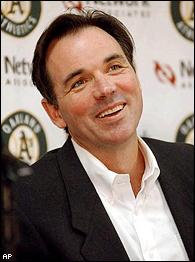 Sigh... it's been a few years since Moneyball came out, and still national writers miss the point of the book. Hence, this column I see on ESPN.com... "Modified Moneyball Pays Off for A's"
Sigh... it's been a few years since Moneyball came out, and still national writers miss the point of the book. Hence, this column I see on ESPN.com... "Modified Moneyball Pays Off for A's"Now, the author has no bad intentions with this column, and it gives praise to Beane, who, more than perhaps any GM, deserves it. But I'm sick of the misconception that Moneyball is about signing guys with a high OBP... it's about finding inefficiencies and going for guys that are undervalued. Which is what consistently Beane does better than anyone else. Let's take a look at some of the passages in the article.
But no matter how this postseason series with the Twins plays out, 2006 has marked not only a continuation of Beane's winning strategy, but a maturation of the thought process that accompanies it. It turns out that "veteran" and "Oakland" are not necessarily mutually exclusive terms.
According to my reading of this paragraph, the writer assumes that Beane's though processes "matured" as he realized something about how veterans are valuable. This is not a maturation of Beane's thought process.
For one thing, Beane has never been opposed to bringing in "veterans" and I'm not really sure where the writer is getting that. Beane always seems to be the guy that brings in low-cost free agents, and he's usually one of the most active traders in the trade market. Sure, he lets a lot of guys go and trades off some talent, but that has a lot more to do with money than about Beane not valuing "veterans." Where would the As be if they had resigned Tim Hudson and Mark Mulder? Well, they'd have no money and be completely handcuffed.
Two, the fact that Beane has largely changed what type of team this is does not mean that his thought process has "matured," only that he's recognized what the market is undervaluing. It's not that Beane suddenly discovered the value of veterans, it's that he picked up some guys that weren't valued enough on the open market. More on that later.
In Frank Thomas, Esteban Loaiza and Milton Bradley, Beane last offseason added some well-considered risk to his formula, which normally skews younger, cheaper and more inside-the-numbers productive.
There's always been risk to "his formula," it's just that he takes calculated risks with guys that are undervalued. A lot of teams didn't want Frank Thomas because he was perceived as being injury-prone and bad in the clubhouse. Beane knew he was still a great hitter and signed him.
Bradley was perceived as being a clubhouse cancer and a bad guy, which made him a little undervalued. So Beane traded for him, and he's been great in RF offensively and defensively. To be honest, I didn't really like the Loaiza deal when it was made, and I still think he may have been a little overpaid, but that seems to be working out so far.
By the way, not to toot my own horn, but here's a comment I made when the A's signed Frank Thomas:
For more proof that Billy Beane is the best GM in the MLB, look at his signing of Frank Thomas. Frank was the 2nd best hitter of the 90s, and even though he's declined, he's still a good hitter. He has above average power, and he has a great eye. If he's healthy, which is a big risk, he's a very good DH, a route that I wish the Twins would have pursued.
But moving on with the article...
Macha is a veteran manager guiding what, for the A's, is an unusually veteran team. That much marks a small modification to the "Moneyball" approach. The fact that Beane isn't afraid to take credit for it doesn't mean he's wrong.
First off, I guess I'd disagree that the A's are an "unusually veteran team," but that's basically just arguing semantics. However, I still fail to see what modification was made to the Moneyball approach... the A's are continuing to look for undervalued players in the market.
The biggest example of this is the draft. When the book came out, the A's had the philosophy of drafting mainly college players, as they felt that those players carried less risk and were undervalued. Well, everyone else started to figure that out too and took more college players. So what did Beane do? Started taking lots of high school players. This may seem like another "modification" to the Moneyball approach, but it's a gross misunderstanding of it. Beane sees that high school players are becoming undervalued, so he drafts more of them. This doesn't mean he feels his thinking about college players was wrong, just that he gets more value out of high school players at this time.
The last sentence, I don't really get. "Beane isn't afraid to take credit for it?" What does this mean? Just because a book comes out about Beane and the A's does not mean that Beane is taking all the credit for what they're doing... that is bordering on Joe Morgan territory saying something like that.
But anyway, the point is, this is not "Modified Moneyball." It's "Moneyball" at its finest.